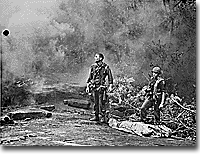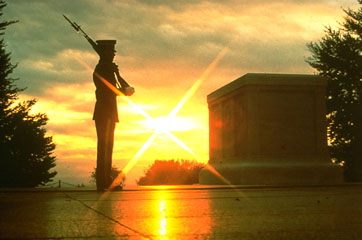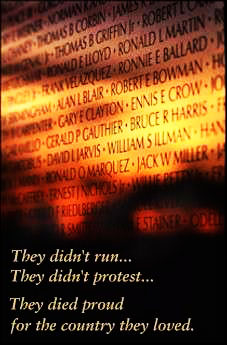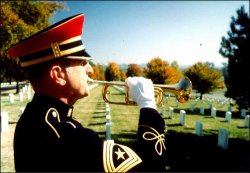TWENTY-FOUR NOTES ON A BUGLE

Date: 1966
Title: Long Khanh Province, Republic of Vietnam...SP4 R. Richter, 4th Battalion, 503rd Infantry, 173rd Airborne Brigade, lifts his battle weary eyes to the heavens, as if to ask why? Sergeant Danial E. Spencer stares down at their fallen comrade. The day's battle ended, they silently await the helicopter which will evacute their comrade from the jungle covered hills.
Source: National Archives and Records Administration |
Although not strictly a hymn, the strains of "Taps" are probably the most recognizable twenty-four notes in our country's musical history. The eloquent and haunting melody has drifted over the graves of soldiers since it was played by a lone bugler on a Civil War battlefield in 1862.
It was mid-summer and the Union and Confederate armies had been fighting for seven long days at Harrison's Landing in Virginia. Brigadier General Daniel A. Butterfield was serving as commander of a brigade of the Fifth Corps of the Army of the Potomac. The fighting had been brutal and the troops on each side had suffered considerable loss. At that time, the only efficient way for leaders to communicte with their troops was with the use of bugle calls designated for specific purposes. There were calls for charge, retreat, lights out, and other orders. On this particular evening, Butterfield contemplated the traditional tattoo, or taps, used to signal lights out. He felt it was too rigid and not melodic enough to signal the end of the day. Unable to write music, he composed a variation of the tattoo in his head, called in someone who could write down the notes as he whistled them, and had him jot down the melody on the back of an envelope. Then Butterfield sent for his brigade bugler, Oliver W. Norton. Together they tinkered with the melodic line until the general was satisfied. At the end of their meeting, Butterfield directed Norton to substitute the new call for taps from that evening on. Norton wrote in a letter to a reporter several years later:
The music was beautiful on that still summer night and was heard for beyond the limits of our Brigade. The next day I was visited by several buglers from neighboring brigades, asking for copies of the music which I gladly furnished. I think no general order issued from army headquarters authorizing the substitution of this for the regulation call, but as each brigade commander exercised his own discretion in such minor matters, the call was gradually taken up through the Army of the Potomac.
The bugle call was initially intended to signal the setting of the sun, but the tradition of playing "Taps" at military funerals began very shortly after its composition. Captain John C. Tidball of the Union army was charged with supervising the burial of his cannoneer killed in action during the Peninsular Campaign at Harrison's Landing. At that time, the custom was to fire three rifle shots over the grave at the close of the funeral service. But Tidball's troops were concealed in the woods in an advanced positon, He feared that the firing of three volleys so near enemy forces might renew fighting and so decided to substitute the sounding of "Taps" as a tribute to the fallen comrade. Before long, the custom was carried throughout the Army of the Potomac until is was eventually confirmed by orders as the official tribute at the grave of any fallen serviceman.
It seems fitting that a melody played most often at times of great human drama be sung both to mark the close of a day and to reflect on the close of a life. At the end of the day, as well as at the end of a life, there is the longing assurance that "all is well for God is nigh."

Tomb Of The Unknowns
Arlington National Cemetery
Washington, DC
The famous and solemn Changing of the Guard at the Tomb of the Unknowns in Arlington National Cemetery is conducted every hour, on the hour, from October 1 to March 31; and every half-hour from April 1 to September 30. Guarding the Tomb is a privilege, and sentinels take 21 steps before turning and facing it for 21 seconds. This corresponds with America's highest military honor, the 21-gun salute. |
|
"Good Bye, Son"
Day is done,
Gone the sun
From the hills,
From the lake
From the skies.
All is well,
Safely rest
God is nigh.
Go to sleep,
Peaceful sleep
May the soldier
Or sailor
God keep
On the land,
Or the deep
Safe in sleep
Thanks and praise,
For our days
'Neath the sun,
'Neath the stars
'Neath the sky.
As we go,
This we know
God is nigh.
|
Sounds Of Viet Nam

|

Story taken from HYMNS OF PRAISE, Ideals Publications, A division of Guideposts, Nashville, TN page 154-157.
|